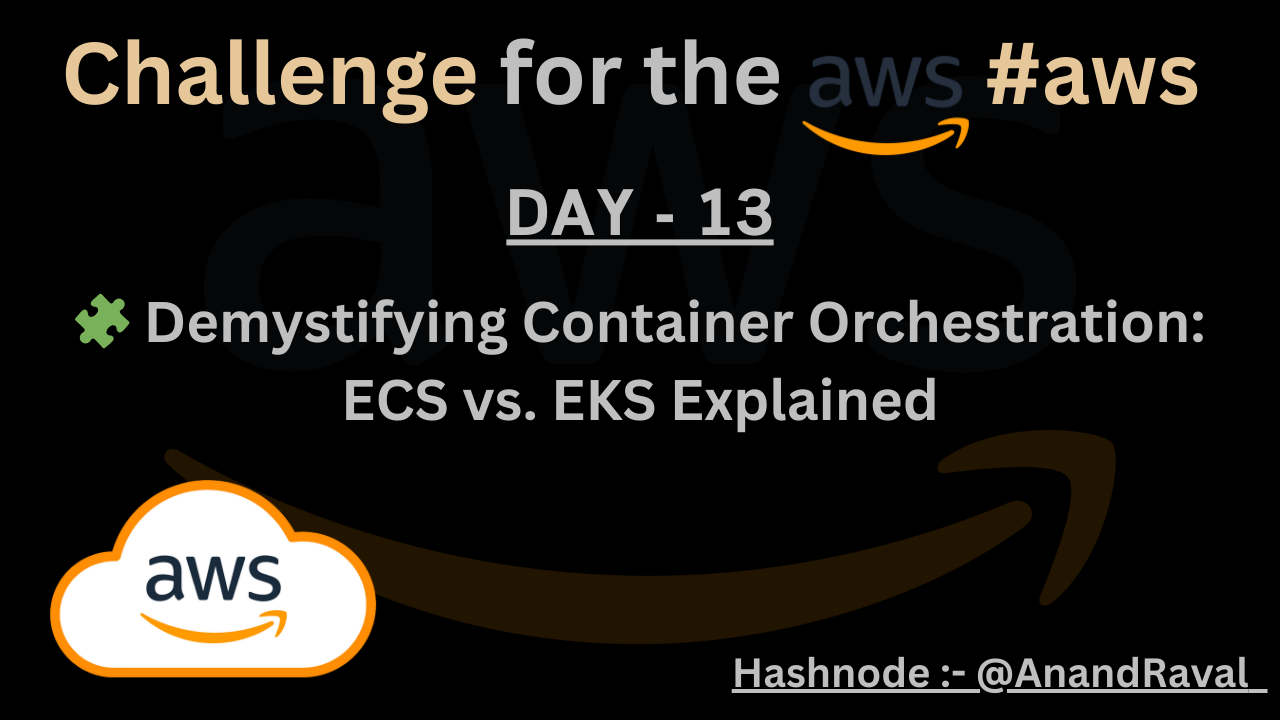DAY 13 : 🧩 Demystifying Container Orchestration: ECS vs. EKS Explained
 Anand Raval
Anand Raval
Understanding Containers and Orchestration
Containers
Containers are a tool that allows you to package an application along with all necessary files, libraries, and dependencies required for it to run. They provide a consistent environment for application deployment, making it easier to manage and scale applications across different environments.
Container Orchestrators
Container orchestrators are the brains of a containerized environment. They handle various tasks, including:
Deploying containers across all available servers
Sending load-balancing requests to containers
Providing container-to-container connectivity
Restarting failed containers
Moving containers when hosts fail
Amazon ECS (Elastic Container Service)
ECS is a fully managed container orchestration service provided by AWS. It simplifies the management and scaling of containerized applications. Key features include:
AWS manages ECS, handling all orchestration tasks.
Containers can run on EC2 instances or AWS Fargate.
ECS is specific to AWS, leading to potential vendor lock-in.
Simpler architecture and API, making it easier for new team members to learn.
No cost for the control plane; charges apply only for the infrastructure running applications (EC2, EBS).
Kubernetes
Kubernetes is an open-source container orchestrator that can be run on any platform, providing more flexibility and avoiding vendor lock-in. A Kubernetes cluster consists of:
Control-plane nodes: Manage the cluster and ensure it remains in a working state.
Worker nodes: Responsible for running the containerized workloads.
Amazon EKS (Elastic Kubernetes Service)
EKS is AWS's managed service for Kubernetes, which handles the control plane for you. Key points include:
EKS is based on Kubernetes, which is open-source and can be run on any platform.
More complex with a steep learning curve compared to ECS.
Larger community and more online support.
Offers more tooling options like Helm, Kustomize, and ArgoCD.
Generally more expensive than ECS, with costs for both the control plane and worker nodes.
Comparison: ECS vs. EKS
Vendor Lock-in: ECS is proprietary to AWS, making migration to another cloud provider challenging. EKS, being based on Kubernetes, is more flexible.
Learning Curve: ECS has a simpler architecture, while Kubernetes (and thus EKS) is more complex.
Community and Support: Kubernetes has a larger community and more support online.
Pricing: ECS charges only for infrastructure, while EKS involves additional costs for the control plane.
Thankyou for reading !!!!
Subscribe to my newsletter
Read articles from Anand Raval directly inside your inbox. Subscribe to the newsletter, and don't miss out.
Written by

Anand Raval
Anand Raval
"I'm a 3rd-year Computer Engineering student at Marwadi University with skills in C++, web development (MERN stack), and DevOps tools like Kubernetes. I contribute to open-source projects and share tech knowledge on GitHub and LinkedIn. I'm learning cloud technologies and app deployment. As an Internshala Student Partner, I help others find jobs and courses." now currently focusing on #90DaysOfDevops